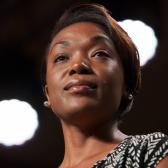REBECCA DUPAS:
I've always thought that I'd rather be accepted than tolerated. And I think that, a lot of times when groups come together who are not necessarily used to coming together, they'll tolerate that moment. But I think that from the necessary discussions about injustice or fairness, that perhaps we can learn to accept one another, not only as people but also other people's ideas and perspectives.
ALEISA FISHMAN:
As a senior in high school, Rebecca Dupas took part in a program sponsored by the US Holocaust Memorial Museum, called Bringing the Lessons Home. The program teaches young people about the Holocaust, so that they can help spread understanding about the dangers of hatred and prejudice. They are lessons Dupas has put into practice in her own life as a young student and now as a high school teacher.
Welcome to Voices on Antisemitism, a podcast series from the United States Holocaust Memorial Museum made possible by generous support from the Oliver and Elizabeth Stanton Foundation. I'm your host, Aleisa Fishman. Every other week, we invite a guest to reflect about the many ways that antisemitism and hatred influence our world today. Here’s high school English teacher Rebecca Dupas.
REBECCA DUPAS:
The Bringing the Lessons Home program is an internship here at the United States Holocaust Memorial Museum that is offered to high school students in the area who are interested in coming into the Museum, learning the history, and then operating in some capacity to tell the story, or even to help the visitors who come here, simply by directing them in the Museum.
I remember during one of the summer programs, students from Germany came to the Museum and we toured those students, we ate with them daily, we roomed with them. But there was a time when we came into one of the theaters here to just discuss the week, and discuss the tour, and discuss what we had experienced. And I just remember one of the young men standing up, and he was angered in a sense. I remember him saying something about being tired of being blamed. For some reason he felt that throughout the tour and the conversation that some kind of way the blame was being placed on his shoulders as a child of Germany. And that just intrigued me. And even though it's somewhat different, it just reminds me of some of my African-American students who will assert "I'm tired of talking about the oppression. I'm tired of talking about slavery." You know, "Let's just move on." And it's that sentiment that is the very reason why this program is necessary, because you can't just move on, because history repeats itself. What you have to do is just to find a...I guess a more comfortable way to dialogue about it.
I went to Towson University and it just so happens that many of the cultural groups on the university are separate. But oppression, injustice, intolerance are things that many people can relate to. And so I had the idea to work with the Black Student Union and Hillel, which is the Jewish student organization, to collaborate a series of events over a month's time. And many conversations came out of that. We talked about oppression, we talked about history, we talked about the possible parallels. And it was a very uncomfortable situation. Many students were angered by the idea of coming together and sharing the history. Everyone did not participate. Everyone didn't see the importance of it, but I think the most important thing is that there were interactions at that moment that had not existed before.
It's sometimes difficult to bring communities together to talk about difficult histories, but it's important that individuals have the opportunity to get things off their chest. When I think about the student from Germany that summer who spoke about being tired of being blamed, that's probably something that he was carrying for a while. But to be able to stand up and to say that, to release that anger, I'm sure that it helps the individual, but it also gives the rest of us something to think about. Or even share new perspectives that may change someone's position. And sometime in the future they'll come to see the similarities more than the differences.
ALEISA FISHMAN:
Voices on Antisemitism is a podcast series of the United States Holocaust Memorial Museum. Join us every other week to hear a new perspective on the continuing threat of antisemitism in our world today. We would appreciate your feedback on this series. Please visit our website, www.ushmm.org.

